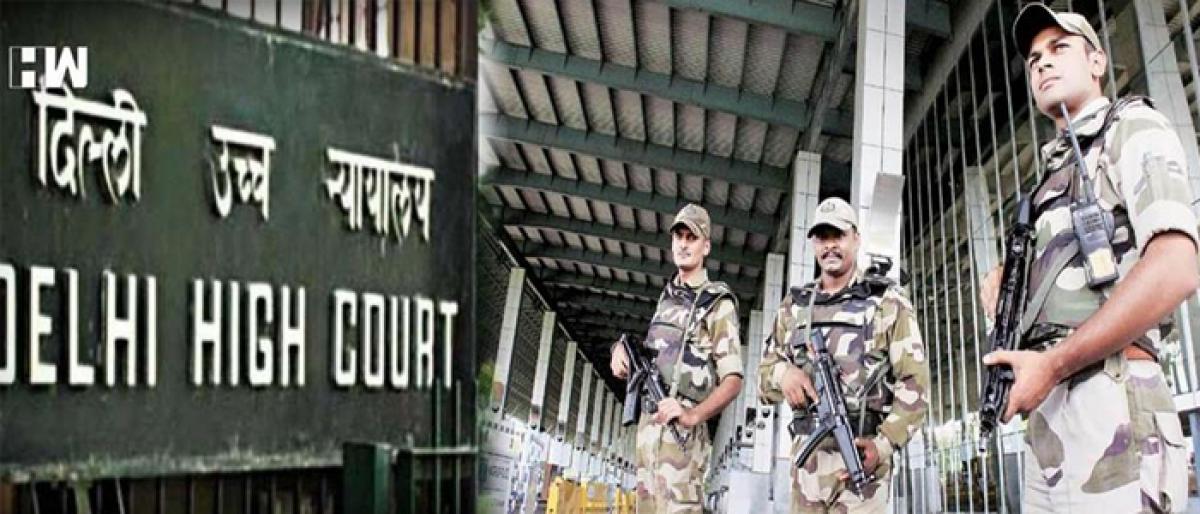Live
- Nifty back below 200EMA/ 200DMAs
- US Navy shoots down own jets over Red Sea
- Nara Devansh sets world record in chess
- Team India cross their fingers
- 3 energy efficient projects to reduce power bills in AP
- Governor Jishnu Dev Varma to Attend ABVP 43rd State Conference in Siddipet Today
- Transgenders to Begin Traffic Assistant Duties in Hyderabad from Tomorrow
- Police Security Tightened at Allu Arjun’s Residence After OU JAC Vandalism
- ED Likely to Issue Notices to BRS Working President KTR Today
- CM Chandrababu Naidu to Attend Christmas Celebrations in Amaravati Today
Just In
HC upholds termination of services of 16 CISF personnel suffering from colour blindness


The Delhi High Court has upheld the termination of services of 16 CISF personnel who were suffering from colour blindness or defective vision
New Delhi: The Delhi High Court has upheld the termination of services of 16 CISF personnel who were suffering from colour blindness or defective vision.
A bench of justices Hima Kohli and Rekha Palli said once the authorities had specifically prescribed a set of medical standards for recruitment, it is not open to the court to tinker with those standards.
The bench noted that the policy guidelines laid down by the Ministry of Home Affairs in February 2013 left no manner of doubt that any person who had a defective vision or was colour blind was ineligible for recruitment in the Central Armed Police Forces (CAPF) or Assam Rifles.
Sixteen CISF personnel had approached the court challenging September last year's orders by which they were terminated from the armed force.
They had also challenged the order by which the appeal against their termination was rejected by the Inspector General of Central Industrial Security Force (CISF).
The affected personnel contended that the authorities' action of terminating their services after finding them medically fit in the initial medical examination was arbitrary and illegal.
They said the termination was at a belated stage when they had already undergone training for three to five months and it was unfair and stigmatic as now they had become overage for any other recruitment.
The bench said if any person was wrongly recruited despite having the defects of colour blindness, he was to be promptly removed from service, as soon as the defect was noticed, and appropriate disciplinary action for major penalty was required to be initiated against the doctor who had declared him fit.
"The aforesaid guidelines are not under challenge before us and therefore, on this ground alone, the challenge of the petitioners is liable to fail as it has neither been urged before us that the petitioners are not suffering from colour blindness, nor it has been contended that the aforesaid guidelines are inapplicable to them," the bench said.
The bench said there was no merit in the petition which was dismissed as being without merit. Following an advertisement in January 2015 by the authorities, the 16 persons had applied for the post of constable in the CISF.
They cleared the written examination and after undergoing the medical exam in May, 2016, they were found fit, selected and offered the post of constable (GD) in the CISF as per the merit list published in February, 2017.
They were issued appointment letters on March 15, 2017 and directed to report at their respective recruitment training centres for basic training.
The letters specified that they would be on probation for two years. After they reported at the training centres, a colour blindness test of all the recruitees was conducted at the CISF Hospital of the centres and the petitioners were found to be suffering from defective colour vision.
However, before taking any action to terminate their services, they were re-examined by a review medical board and were against declared unfit due to defective colour vision and their services were terminated.
The court said the facts show that these personnel were recruited after a condition was introduced in the policy guidelines of February 27, 2013 specifically prohibiting the recruitment of persons suffering from colour blindness or defective vision.
"Even otherwise, we are of the view that once the respondents (authorities) have specifically prescribed a set of medical standards for recruitment, it is not open to the court to tinker with the said standards or to hold that the action of the respondents in terminating the services of the petitioners, who admittedly did not meet the criteria prescribed in the guidelines, is in any manner illegal," it said.

© 2024 Hyderabad Media House Limited/The Hans India. All rights reserved. Powered by hocalwire.com






